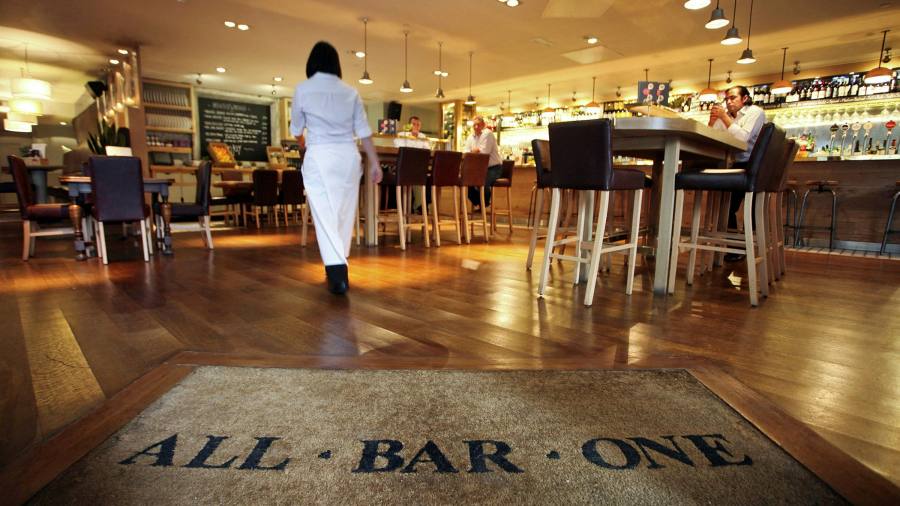[ad_1]
Last orders for Mitchells & Butlers?
The owner of Harvester and All Bar One pubs is raising £350m with an equity sale underwritten by the ultra high-net-worth clique who already owns more than half its stock. Its open offer avoids the formalities of a rights issue that would never have completed in time for a £50m debt repayment due on March 15.
Of course, debt obligations could have been fixed long ago — certainly long before M&B warned in January that it had just £125m of liquidity remaining. Even an April reopening had looked too late for the group, which burns between £35m and £40m every month while its 1,700 pubs are closed.
So by putting together a rescue package at the last possible moment, businessman and Tottenham Hotspur owner Joe Lewis and friends stand accused of playing brinkmanship to dislodge independent management and tighten their control of the business. It is, in effect, a chicken coup.
The so-called Sandy Lane set — Lewis, fellow currency trader Derrick Smith and the horseracing magnates John Magnier and JP McManus — have formed a concert party that will use a combined 55 per cent holding to oust independent non-executive directors and worry less about small shareholders. The rush-job refinancing is likely to strengthen their hand further because shareholders cannot sell on entitlements to new equity, as is the case with a rights issue, and the consortium will buy any unsold stock at a 36 per cent discount to Friday’s closing price.
Urgency may be what helped convince the Takeover Panel that a concert party holding more than 30 per cent of the equity did not need to make an offer for the rest, which would have been another time-consuming process. More than a decade ago, the Panel could find no evidence that M&B’s main investors were colluding to oust the board; this time around there is confirmation but no time to care.
Chief executive Phil Urban had made a case for patience, hinting that an earlier cash call would have been too small to cope with the many unwelcome surprises landlords faced over the past year. Yet to suggest shareholders would be unsympathetic is a stretch. Just look at sector peer JD Wetherspoon. Its shares have more than doubled from the March low even after it took two bites out of shareholders, raising survival funds in April then again last month.
Instead, the path taken has established M&B as a semi-private company that should be off limits for any investor who claims to care about representation and corporate governance standards. Its minority shareholders ought to back the deeply discounted cash call, if they can, then exit as soon as possible afterwards.
Few-Jags
Jaguar Land Rover’s new “Reimagine†strategy certainly leaves plenty to the imagination, writes Jonathan Ford.
Such as what the UK carmaker might actually build at its Castle Bromwich site (one of its three UK plants) once fossil-fuel powered Jaguar production tails off with the switch to an all-electric range post 2025.
JLR’s big announcement on Monday (apart from that all-electric leap) was the decision to scrap its main existing electrification plan. It’s no longer going to build an electric successor to its flagship XJ saloon. That threatens to leave the production line at Brom a tad deserted unless something else comes along.
Cue predictable wails about Britain’s slowness to the EV party and how this has contributed to JLR’s sliding sales. But are these wholly fair? True, JLR was fined by Brussels for not reducing emissions enough, but that’s mainly a function of all those big engined Land Rovers it makes. EVs made up 6 per cent of JLR’s total sales last year and plug-in hybrids another 5.5 per cent — roughly comparable to the market as a whole.
The challenge JLR’s new chief, Thierry Bolloré, must address is how to continue the shift to zero carbon while balancing development costs on JLR’s slender sales base. It does not help that the premium end of the market is everyone’s first choice to electrify. Manufacturers are pushing so many new models that even Tesla (which is investing in bitcoin 40 per cent of what Bolloré is promising to splash on electrical R&D in a year) is cutting its prices.Â
With regulations tightening and consumers warming to EVs, there is little mileage left in incremental steps. For one thing, if JLR is to have an electric future in the UK (as opposed to Austria where it makes the iPace) it needs to encourage someone to start making batteries big time in Britain.Â
Scrapping the XJ may seem an odd start. But JLR needs fewer platforms and to focus on the right ones. Talk of sharing more R&D with Tata makes sense too, given that JLR’s assuming not only the cost of going electric but also developing hydrogen technology for its larger models.
The French have a saying that it is sometimes necessary to “reculer pour mieux sauterâ€. Or take a step back to make a better leap.Â
The scrapping of the XJ may not be Bolloré’s last backward step, although he will doubtless want to avoid plant closures in febrile post-Brexit Britain. The real question is how big a leap the Big Cat will ultimately be able to make.
M&B: bryce.elder@ft.com
Jaguar: jonathan.ford@ft.com
[ad_2]
Source link





